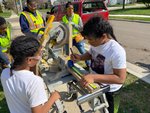



(This story has been corrected to show that Lansing reported 21 homicides in 2020.)
Mike McKissic wants to end an epidemic in Greater Lansing.
McKissic’s son Michael “Mikey” McKissic II, 23, was shot and killed in 2015. Today, local cops are still searching for clues. McKissic and his family have upped the reward to $50,000 for any tips that lead to an arrest.
And while he waits, McKissic is doing everything he can to stem the tide of gun violence in Greater Lansing and beyond — one local “kid” at a time.
His goal: ensure another local family doesn’t have to shoulder the same grief as his own.
“We’re just trying to turn the tragedy of what happened to my son into something positive,” McKissic said. “Kids will listen to someone that has walked the walk. You might not be able to reach some of them, but you can try. That old proverb: It takes a village. That means having a safe and healthy society for youth to grow up in. There are a lot of ingredients to put together.”
Last year, Lansing charted a record-breaking 21 homicides — the highest annual total in at least 30 years. In the first five months of 2021, the city has tracked at least a dozen more murders.
Paired with 29 nonfatal shootings and 544 gunshot reports to the Lansing Police Department, officials said the Capital City is on pace for another unprecedented summer of violent crime. And with nearly 600 illegal guns seized from the streets in the last 18 months, Police Chief Daryl Green has labeled the city’s problems with violence as part of a nationwide epidemic.
“There are a lot more guns — legal guns and illegal guns — finding their way to the streets,” Green said. “I have never seen this. I’ve been here for 24 years and I don’t think I’ve ever seen this many guns on the streets of Lansing. The really violent shootings that we see? Those are mainly illegal guns being used. We truly have an epidemic of stolen guns. It’s a real problem.”
Lansing’s rapid rise in violent crime is mirrored in cities across the United States and also correlates with a shopping spree on guns across the country. Precise gun ownership statistics are not tracked in any federal, state or local registries, but ownership trends can be extrapolated from rising rates of firearm background checks and county-level licenses for concealed pistols.
More than 1 million background checks for firearms were conducted in Michigan last year — an 84% increase from 2016. Another 120,000 background checks in January pushed that statewide total past 400,000 in the first four months of 2021. Licenses for concealed pistols are also rising statewide. More than 160,000 permits were issued statewide over the last year.
Ingham County doled out more than 4,200 permits last year — up from an average of about 2,600 in the three years prior. And the county is on track to nearly double that average in 2021.
Government officials and community leaders are quick to draw a distinction between registered firearms and the surplus of illegal guns that are finding their way onto the streets of Lansing, but the sheer number of weapons being seized in routine traffic stops is a key community concern.
And with the warmer summer months often correlating with an increase in violent crime, officials expect things could get (much) worse before any police intervention, gun control legislation or community-driven support networks have an opportunity to make a real difference in Lansing.
“I don’t want to predict exactly what will happen, but historically, summer months are much more violent,” explained Ingham County Prosecutor Carol Siemon. “People are just physically outside more often. It stays light longer. When it’s hot, tempers can also get hot. People sit around drinking all day. Things happen. That’s typical of gun violence and other forms of violence.”
If violent crime rates stay steady, another 24 Lansing residents could be murdered by Christmas and 60 more could be wounded by gunfire. And everyone has a role to play in prevention.
“When we have elderly people in this community who are afraid to go outside because of gun violence, we have failed them as a community, and it’s up to us, collectively, to come together and try to do the best we can,” McKissic said. “I don’t have all the answers. Nobody does.”
Greater Lansing is all too familiar with how to handle an epidemic. Ingham County Health Officer Linda Vail has guided the region for more than a year while it nears the final chapter of COVID-19. And gun violence can be eradicated following a similar approach, she explained.
But before any targeted interventions can make an impact, it’s best to understand the problem.
“It involves policing, but it’s not all policing,” Vail said. “It’s public health. It’s community-based solutions, mental health and social work, substance abuse and treatment and prevention. It’s many, many things that fall into the category of what’s causing these violent issues in Lansing.”
Officials are quick to mention that 2020 was far from a routine year for law enforcement. The pandemic reduced contact between citizens and police. Local officers have struggled to rebuild community trust amid a wave of protests against racism and police brutality. Thousands of residents have been put out of work and have been cooped up at home — the “perfect storm,” Green said, for unchecked mental health and substance abuse issues to become dangerous. Isolation can also breed depression, anxiety and idle hands that could be leading to more criminal behavior. The economic toll from the pandemic has also created a sense of desperation, made worse by relatively unfettered access to high-powered firearms nationwide.
Political unrest and a failed insurrection further fueled tempers. George Floyd’s death in Minneapolis, subsequent Black Lives Matter protests and calls to defund police departments nationwide have only added to a growing sense of distrust. That social tension could also equate to an increased reliance on street justice to resolve interpersonal disputes, Vox reports.
Green suspects most of the gun violence locally has come from a small and violent subsection of the population — namely young Black men turning from fists to bullets in personal disputes, often in retaliation for other criminal behavior. Six of those killed so far this year are Black.
It’s no different from statistics that are playing out in hundreds of communities across the U.S.
“When people look for the government, they look for the police,” Green said. “They don’t see City Council or City Hall coming into their neighborhoods. Primarily, their closest touch to the government is the police. The pandemic created this void where police couldn’t get out of their cars and have the positive engagements that we normally have with community members.”
Lansing cops typically connect with residents for “positive community engagements” about 400 times each year. Social distancing reduced that tally to fewer than 50 across Lansing last year.
“I’m optimistic that as things continue to open up and people get out of their houses that we’ll see some of this reduced, but I have nothing that proves whether that’s going to happen or not,” added Mayor Andy Schor. “The proliferation of illegal guns is certainly a huge problem for us.”
Green is confident that violent crime rates will decrease locally as his officers spend more time engaging with residents. An ice cream social or a pick-up game of streetside basketball with children can go a long way in developing a meaningful relationship between residents and cops.
Green also touted plans to ramp up community policing efforts where individual officers can form deeper relationships with certain neighborhoods. He also wants to make better use of data to track geographic and demographic trends on recent crimes for a more targeted response.
The Police Department, he said, doesn’t get enough “credit” for its investigations of nonfatal shootings, which help to mitigate a dispute before they lead to deadlier consequences.
“That’s the most critical aspect for me — not just the shot-fired calls but also nonfatal shootings,” Green said. “Maybe they don’t seek revenge, but maybe it’s a friend or a family member. We try to intervene in those circumstances but we don’t get any credit for that at all.”
It’s difficult to determine how many lives have been saved through targeted police interventions, Green explained. Bullet casings from nonfatal shootings, for example, can help investigators locate suspects before deadlier encounters can occur.
Schor told City Pulse last year that Lansing was “doing all that we can” to curb violence, namely by ramping up patrols in “hotspots” on the city’s south side and going door-to-door trying to convince residents and businesses to snitch about recent crimes and to register their surveillance cameras with the Police Department. Partnerships with other police agencies — like the Ingham County Sheriff’s Office — have also helped in solving several violent crimes.
The sounds of Michigan State Police helicopters circling Lansing as part of the city’s Violent Crime Initiative have also become increasingly common and are set to continue this summer.
In recent months, the City Council also voted to eliminate some ordinances — like one that bans loitering in areas where drugs are known to be sold — to help rebuild trust and reduce any unnecessary contact between citizens and cops. Green also put policies in place last year that prevent his cops from stopping drivers solely for certain traffic infractions like a busted taillight.
Attempts to reduce funding to the Police Department have repeatedly failed under the Schor administration, which recently increased the police budget by $600,000, which includes a second and third social worker and another staffer to process records requests. Green also has a pipe dream of adding 50 more officers to the streets to mitigate crime, which Schor said he would be willing to support — if the city can find enough cash to make it work.
“I wouldn’t take it off the table, but we just don’t have the money for that now,” Schor said.
Added Green: “There’s an economic piece to this as well. People have to get back to work. Particularly young adults, they need to get back to work — and in decent paying jobs as well. I believe that economic stability has to increase for this to work. The economy is tied to crime.”
The city is also planning to partner with the county to launch the Advance Peace initiative in Lansing this year, which will partner about 25 residents who are most likely to get involved with gun violence with local mentors who, in turn, can then connect them with various social services and job opportunities over 18 months. Recruits will also be paid monthly cash stipends.
Two new community health workers will also be stationed at the Fire Department this summer to help connect residents with social services rather than sending in cops and paramedics for calls to address issues such as homelessness, substance abuse and unchecked mental illnesses.
The Council also set aside funding for a new quarterly expungement clinic to assist residents with clearing misdemeanor convictions from their records and policy language that directs next year’s mayor to consider additional funding to better investigate unsolved homicides in the city.
A partnership with the national Gun Safety Consortium could also bring the Police Department biometric “smart guns,” which require a passcode or fingerprint to be unlocked. While the city hasn’t had problems with cops losing their guns, Schor said the concept is focused on encouraging gun manufacturers to create weapons that cannot end up in the wrong hands.
The Police Department is also exploring a program called ShotSpotter that uses strategically placed acoustic devices to alert officers to the sound of gunfire in real time.
“We’re doing our best to get in front of this and intervene in that small population of those causing violence,” Green said. “There are still opportunities for community members to engage that youthful population. We welcome that. I don’t think this is just a police issue. This is a community issue as well. I think we all have a responsibility to deescalate the violence.”
McKissic — like many other activists in Lansing — takes that responsibility to heart. He launched the Mikey 23 Foundation after his son’s death with the goal of preventing others from meeting a similar fate. He said local kids and young adults, particularly in the last year, have found themselves with far too much time on their hands and nothing productive to do.
“Police can’t reach the youth like real people in the community,” McKissic said. “A lot of these kids don’t have any sort of guidance in their lives — no fathers or positive role models. We try to give them that at Mikey 23. We also try to teach the importance of giving back to our society.”
The Mikey 23 Foundation, named in honor of McKissic’s son, connects licensed builders, electricians and plumbers with local youth for hands-on apprenticeship opportunities for self-development and growth, “empowering young people to reach their full potential,” McKissic said. Together, they renovate homes across the city and turn them over to those in need.
A local scholarship program also gives kids a chance to write an essay about how to reduce gun violence. Mikey 23 also partners with other groups in the city — like The Village Lansing, The Advocates, Siblings Against Guns, Moms Demand Action and Brotherhood Against Drugs.
This year, Mikey 23 was among 10 benefactors of an annual fundraiser from Michael Bloomberg’s nonprofit Everytown, which usually hosts “Wear Orange” marches in recognition of National Gun Violence Awareness Day, which occurs on the first Friday in June. This year’s annual event was totally virtual.
“It’s not going to be a magic potion, but it should help make inroads,” said Katie See, who helps lead the Greater Lansing chapter of Moms Demand Action and retired from Michigan State University after a 32-year career teaching courses and authoring books on topics like comparative race, ethnic relations, social stratification and political sociology.
See’s group focuses largely on raising awareness of the underlying causes of gun violence, teaching people how to be safe with their firearms and also lobbying for additional regulations — like more stringent universal background checks to help reduce easy access to illegal guns.
Despite some attempts at reforms, local Democratic lawmakers like State Rep. Sarah Anthony and Sen. Curtis Hertel said they don’t expect much progress on gun control in Michigan’s Republican-led legislature. Attempts for federal changes have also met sweeping opposition.
That leaves Lansing — at least for now — relying on police and community-driven support.
“There are groups like Mikey 23 that aren’t directly addressing gun violence, but directly addressing the conditions that give rise to gun violence locally,” See said. “That’s crucial.”
Former firefighter and local Black Lives Matter coleader Michael Lynn Jr. is among those leading the charge on community-based support. His nonprofit, The Village, regularly works with schools and local families to identify concerns and funnel donated resources to the frontlines.
His other organization, The Advocates, focuses on gun safety with classes that offer training on gun safety and tactical self-defense. Lynn’s newest initiative offers anyone turning 21 in Lansing this year a chance to take a class, head to the range and receive their CPL permit at no cost.
“We don’t do the abstinence approach. We know these kids are going to find guns and encounter guns with friends. This is about teaching them the safe way to do it,” Lynn said. “These kids are going to carry. Let’s make it legal for them. Let’s show them the right way.”
James Henson launched the Young Black Panthers Party last year with a similar mentality. In addition to teaching Black history and promoting Black independence, he also wants to ensure that every young person of color in Lansing understands how to safely handle a firearm.
His Facebook feed is routinely filled with images and videos of him with high-powered rifles.
“I want people to learn about guns — not just shooting them and learning how to shoot them, but about safety,” he said. “We’re helping people the best way we can by teaching our people what to do and what not to do so they don’t have to continue to die these horrific deaths.”
Larry Johnson, brother of basketball star Earvin “Magic” Johnson, also plans to speak at every school in Lansing this fall to stress the importance of avoiding drugs, alcohol and gang-related crimes — all pitfalls that he faced before he founded Brotherhood Against Drugs in 1995.
The sole mission of the organization is to help people who are struggling with addiction through sharing recovery stories inspired “with the power of God’s love” to guide them in a turnaround. In volunteering with the Ingham County Youth Center, which provides temporary custody for up to 24 juvenile offenders, Johnson realized how closely drugs and gun violence are connected.
“They go hand in hand. Back in the day, I carried a pistol. I was also selling drugs. That all rolls into one,” Johnson explained. “I tell them: You have to change your mindset. Carrying a gun doesn’t make you a big guy. It makes you a target. We have to go into the hood. We can’t be afraid to go into the hood and talk to these young people. We can’t be afraid to listen to them.”
Added Anthony: “I think other cities have done a much better job at recognizing this as a public health crisis — not just declaring resolutions and giving fiery speeches. I just don’t think this community has ultimately decided that this is a true public health crisis and that we’re going to need all hands on deck to treat this like a public health crisis. We just haven’t done that yet.”
Support City Pulse - Donate Today!
Comments
No comments on this item Please log in to comment by clicking here